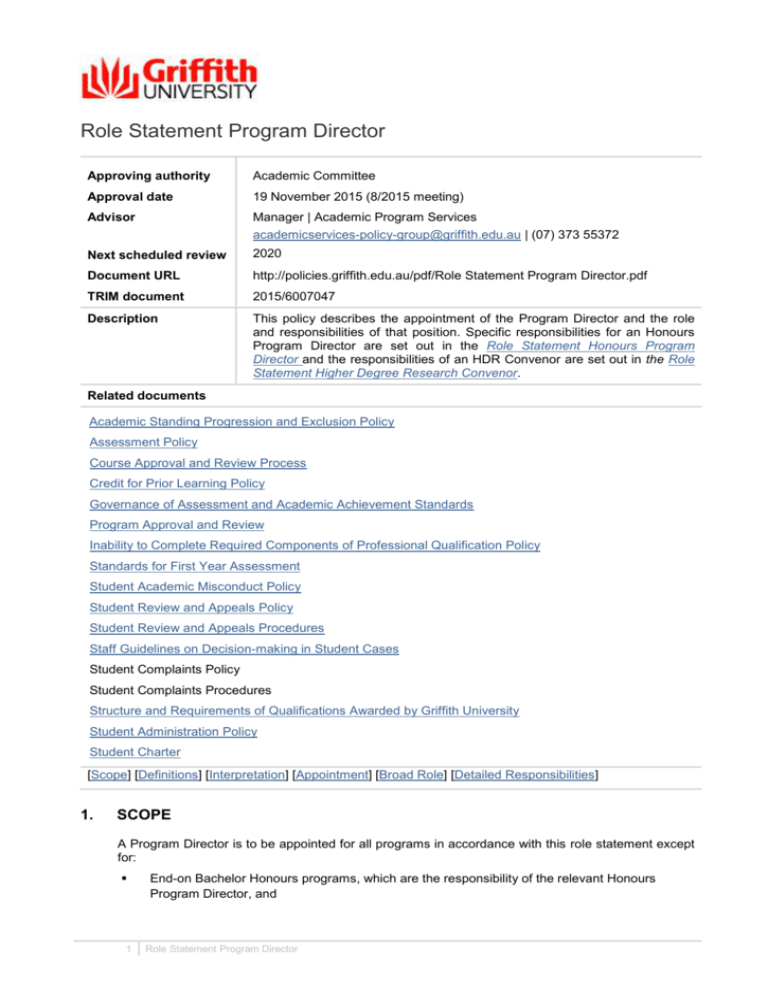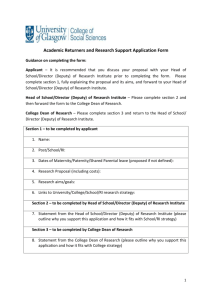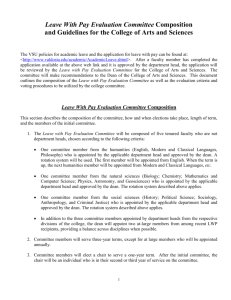Role Statement Program Director
advertisement

Gacademic Role Statement Program Director Approving authority Academic Committee Approval date 19 November 2015 (8/2015 meeting) Advisor Manager | Academic Program Services academicservices-policy-group@griffith.edu.au | (07) 373 55372 Next scheduled review 2020 Document URL http://policies.griffith.edu.au/pdf/Role Statement Program Director.pdf TRIM document 2015/6007047 Description This policy describes the appointment of the Program Director and the role and responsibilities of that position. Specific responsibilities for an Honours Program Director are set out in the Role Statement Honours Program Director and the responsibilities of an HDR Convenor are set out in the Role Statement Higher Degree Research Convenor. Related documents Academic Standing Progression and Exclusion Policy Assessment Policy Course Approval and Review Process Credit for Prior Learning Policy Governance of Assessment and Academic Achievement Standards Program Approval and Review Inability to Complete Required Components of Professional Qualification Policy Standards for First Year Assessment Student Academic Misconduct Policy Student Review and Appeals Policy Student Review and Appeals Procedures Staff Guidelines on Decision-making in Student Cases Student Complaints Policy Student Complaints Procedures Structure and Requirements of Qualifications Awarded by Griffith University Student Administration Policy Student Charter [Scope] [Definitions] [Interpretation] [Appointment] [Broad Role] [Detailed Responsibilities] 1. SCOPE A Program Director is to be appointed for all programs in accordance with this role statement except for: 1 End-on Bachelor Honours programs, which are the responsibility of the relevant Honours Program Director, and Role Statement Program Director Higher Degree by Research programs which includes the Masters (Research), Doctoral (Research) and Doctoral (Professional) degrees. Specific responsibilities for an Honours Program Director are set out in the Role Statement Honours Program Director and the responsibilities of an HDR Convenor are set out in the Role Statement Higher Degree Research Convenor. 2. DEFINITIONS Program Director refers to the academic staff member appointed by the Group Board to provide curriculum leadership for and quality enhancement of one or a suite of the University’s programs while working collegially with the Head of School/ Deputy Head of School, academic and professional staff to ensure an effective and positive student learning experience. There shall only be one Program Director for a program. Program Advisor refers to the academic staff member appointed by the Group Board to support the Program Director in the management of students within the program by working collegially with academic and professional staff. There may be more than one Program Advisor appointed to assist with double degrees, multiple campus offerings of the program or discipline areas refer to section 4 below regarding appointment of Program Advisors. Head of School – appointed by the University Council and responsible for the performance of the School/Department in teaching and learning, research and external engagement; and for planning and aligning financial and staff resources with the University's strategic objectives. Reference to a delegate of the Head of School in this document refers to the Deputy Head of School where the Academic Provost has approved such an appointment. 3. INTERPRETATION In this policy, reference to Academic Group, School, Group Pro Vice Chancellor, Dean or Head of School / Deputy Head of School shall have the meaning set out in "Structure and Governance of Academic Groups of the University policy." 4. APPOINTMENT Each Program is required to have a duly appointed Program Director who shall be an academically qualified (Level C or above), continuing part-time, full-time or fixed-term staff member of the relevant academic element that is the host of the program (Host School/Group).The Program Director is appointed by the Group Board responsible for the program on the recommendation of the Head of School or their delegate in consultation with the Dean (Learning and Teaching) and is responsible to the Head of School/Department of their delegate. The teaching time commitment of the Program Director role will be considered as contributing to teaching and the administrative time commitment of the role will be considered as contributing to service. The balance of these commitments will be taken into account by the Head of School in determining the staff member's academic workload. For the purposes of external accreditation requirements the role of Program Director may also be referred to by another title. Other titles such as Discipline Lead may be used for the purpose of assuring professional accreditation or recognition bodies that the academic staff member has the appropriate authority to ensure proper curriculum guidance for the program and to develop and implement processes for the evaluation, assessment, and continuing improvement of the program, its educational objectives and outcomes. Professional accreditation or recognition bodies may also require the academic staff member holding such a position to be a discipline expert, eligible for 2 Role Statement Program Director membership or a member of the professional/recognition body as well as a senior member of academic staff. In appointing a Program Director of this type the Group Board shall specify the alternate title to be used. Where a program is offered on a number of campuses there should be a single Program Director. To ensure a coordinated and coherent approach across campuses to the offering of a program, a campus-based Program Advisor may be appointed to assist the Program Director for large programs. A Program Advisor may also be appointed to assist a Program Director who is responsible for a suite of double degrees to ensure a coherent and coordinated student learning experience across the two programs. Where a program is multi-disciplinary in nature or there are professional areas or areas of high specialisation within a program discipline-based Program Advisors may be appointed to assist the Program Director to quality assure the majors and capstone courses within a program. Where more than one Group is involved (for example, double degrees) the appointment of the Program Director and Program Advisor should involve consultation between the relevant Host School/Group Boards. The appointed Program Director and Program Advisor/s are entered into the University’s PeopleSoft Student System by staff in Academic Services; this will provide access to details about students enrolled in the program, and in the case of the Program Director to make decisions on student applications. An acting Program Director should be appointed by the Group Board or its Chair, as the Group Board’s delegate, whenever there is a period of absence, and entered into the Student System by staff in Academic Services enabling the appointee to make decisions on student applications. 5. BROAD ROLE The Program Director role should be understood within the broader context of the strategic performance expectations in learning and teaching within the University. The Program Director has a leadership role in assuring the quality of the University's programs and works collegially with the Head of School/ Deputy Head of School and staff in learning and teaching leadership roles across the University to ensuring a positive student experience. The Program Director is responsible to the relevant Head of School/Department or their delegate for the design, delivery and review of the University's programs, as approved by the Academic Committee and published in the Programs and Courses Website, to ensure quality student learning experiences. The Program Director should demonstrate leadership by: Design, delivery and review of program Ensuring quality assurance and quality enhancement of the program; Facilitating and leading the teaching team; Managing the program Engaging with the Industry / Profession; and Providing recommendations on student admission and progression. The Program Director needs to maintain open communication about the program with Heads of Schools/ Deputy Heads of Schools and Course Convenors and should bring to the attention of the Dean (Learning & Teaching) any problems in the program design or offering or achievement of outcomes, and facilitate actions to resolve such problems. The Program Director is a critical communication link between the academic operations and the Student Administration functions concerning the program for which he or she is responsible. The Program Director (or their designated acting Program Director during absences) should be available to respond promptly to requests for information and to make decisions in a timely fashion. To undertake this leadership role, it is important that the Program Director maintains an awareness of contemporary national and international issues in their disciplinary area as well as the broader national higher education learning and teaching agenda. 3 Role Statement Program Director 6. DETAILED RESPONSIBILITIES The Program Director, under the direction of the Head of School or their delegate, has responsibility1 for the following: 6.1 Quality Assurance and Quality Enhancement of programs Program Development When a Program Director is asked to oversee a program development their role includes: - Producing a New Program Proposal which is the curriculum design document, described in the Program Approval and Review policy. - Aligning the program development with Griffith University’s strategic priorities. - Supporting the Dean (Learning & Teaching) in presenting the New Program Proposal, or a Major Change to a program Proposal resulting from a program review, to Programs Committee. Enhancing Program Quality 6.2 6.3 - Maintaining program coherence and consistency of the curriculum and standards (on campus, across campuses, off-campus and offshore) by ensuring regular contact with Course Convenors to evaluate each Course Profile and overall quality of course design, and providing advice to Course Convenors. - Assuring that assessment requirements and standards are appropriately planned and implemented across the program. - Utilising University systems to monitor program alignment with the University’s strategic directions in learning and teaching (for example: the use of consensus moderation in assessment; internationalisation; WIL; blended learning and Griffith Graduate Attributes). - Reviewing the performance of the program, on the basis of program performance data and course experience reports available via the Business Intelligence Portal and providing advice to Course Convenors and the Head of School/ Deputy Head of School in relation to program improvements. - Conducting in-depth program reviews as requested by the Dean (Learning & Teaching) and Group Pro Vice Chancellor. - Analysing Course Improvement Plans, including ensuring the implementation of recommended improvements. - Advising the Head of School /Deputy Head of School on the human, physical and financial resources required to deliver the program effectively. Engaging with the Industry / Profession - Developing productive relationships with the industry/profession (including the relevant Industry Advisory Board) to ensure the relevance of program design, development of program learning outcomes, graduate attributes and employability skills of graduates. - Managing the preparation of documentation for external accreditation or recognition of the program by professional bodies. Leading and facilitating the teaching team - Facilitating collaborative discussion with key stakeholders (Course Convenors, Deans (Learning & Teaching), Deans (Academic), Head/Deputy Head of School/Department, year level advisors, Student Success Advisors and other professional / administrative staff and students) towards the shared goal of providing an effective and satisfying student learning experience. 1 For some of the activities, the Program Director has overall responsibility, but the activity is performed in conjunction with the SAO/PSO, the Group ASC and Student Administration. 4 Role Statement Program Director 6.4 6.5 - Facilitating collaborative discussions between program teams, where programs are delivered via multiple modes and/or locations, to ensure an equivalent experience. - Leading initiatives, in conjunction with relevant staff (e.g. First Year/Commencing Study Coordinator), to ensure students receive a comprehensive orientation and transition to the program and an ongoing quality experience across the student lifecycle in the program. Managing the program - Providing a focal communication link between the academic operation of the program and Academic Administration, including advising on admission requirements, preparation of accurate enrolment and program information in QTAC/UAC Guides, Program Guides (International and Domestic) and the Programs and Courses website, checking courses for the program are scheduled, verifying program and academic plan data for the production of the Australian Higher Education Graduation Statement (AHEGS) and maintaining the program’s entry in the Programs and Courses website. - Managing program arrangements such as articulations and twinning arrangements with partner organisations. - Checking, in conjunction with the Course Convenor and the School Administration/Program Services Officer that the courses required for the program, including electives, and including courses owned by other Schools, are scheduled and available according to the approved program structure as recorded in the Programs and Courses website. Student administration and progression Where a program is offered in more than one location and/or learning mode the Program Director may be assisted by the Program Advisor, except where the Program Director is specified in policy as the decision-maker. Admissions - Making decisions to admit students to the program, where the program is a postgraduate coursework program or an undergraduate program other than a Bachelor Honours program for which there is direct admission, in accordance with the entry requirements for the program. - Approving a specific aspect of a student’s program of study where the program requirements state that Program Director approval is required. - Approving applications for credit in accordance with the Credit for Prior Learning Policy on advice from Student Administration. - Considering applications for readmission after exclusion and making decisions to readmit students to the program. - Managing, in relation to masters coursework and extended programs, the approval of research proposals, appointment of supervisors, the time period over which the research proposal will be conducted; the requirements for submission and examination of dissertations/theses. Counselling and Support - Providing academic advisement to students enrolled in the program in relation to their program of study. - Providing support to Course Convenors and Deans (Learning & Teaching) in dealing with issues of student academic misconduct. - Handling complaints in relation to the conduct of students in the program or in relation to program, course and teaching quality that cannot be resolved informally. Assessment/Progression - 5 In conjunction with course convenors establishing assessment plans and processes for managing assessment tasks in first year undergraduate courses in accordance with the Standards for First Year Assessment. Role Statement Program Director 6 - In conjunction with course convenors establishing those assessment items for which resubmission may be made available and the conditions for resubmission. - Approving student applications for cross-institutional study in accordance with the Student Administration Policy. - Reviewing student progression in reference to the maximum time to complete the program, notifying students of their status and considering applications for an extension, as specified in the Student Administration Policy. - Certifying students have completed all degree requirements and recommending to the Dean (Learning & Teaching) that the award be conferred. - Establishing study plans for students who due to program changes by the University are unable to complete the program requirements in accordance with the Programs and Courses website and recommending to the Dean (Learning & Teaching) that the award be conferred on successful completion of the study plan. - Reviewing student applications for course substitutions and variations to program requirements for the purpose of making a recommendation to the Dean (Learning & Teaching). - Reviewing students who are under consideration for exclusion, making decisions as to which students should be excluded and making recommendations to the Dean (Learning & Teaching) on those students who should not be excluded on the grounds of exceptional or compassionate circumstances. Role Statement Program Director







